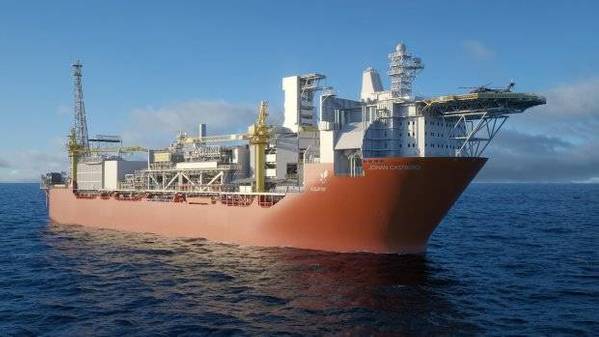
Equinor's Johan Castberg Arctic oilfield will cost some 10% more to develop than expected a year ago, and will start production later than expected, primarily due to the pandemic, the Norwegian government's budget showed on Tuesday.
The project to produce between 400 million and 650 million barrels of oil is now seen costing 59.1 billion crowns ($6.91 billion), up from a 53.4 billion estimate a year ago. It is expected to come on stream in the fourth quarter of 2024, according to the document, later than the previous forecast for a start towards the end of 2023.
Last year, Equinor delayed the field's startup until 2023, partly due to the need to repair welds on the floating production, storage and offloading (FPSO) vessel's hull, which is being built in Singapore.
The field was originally estimated to cost 51 billion crowns and to start at end-2022, when its development plan was approved by the Norwegian authorities in 2018.
PANDEMIC HIT
After the budget was published, Equinor said Castberg remained profitable and would still have a break-even price below $35 per barrel, despite the cost overruns which the company attributed to the pandemic. A barrel of Brent crude traded at $83.9 at 0934 GMT.
"The yard in Singapore has been shut down for long periods, and still has reduced access to manpower due to entry restrictions associated with COVID-19," it said in a statement.
Equinor has a 50% stake in the project, its partner Vaar Energi, a subsidiary of Eni, holds 30% and Norway's state-owned Petoro owns 20%.
Two other fields under development will also face delays and cost overruns due to the pandemic, the document showed.
Equinor's Njord Future field will cost 29.5 billion crowns, around 19% more than estimated a year ago, and will now start towards the end of 2022, almost a year later than envisaged previously.
Equinor said the project remained profitable, even with oil prices "significantly lower" than today's.
Meanwhile, Vaar Energi's Balder Future project will cost 26.8 billion crowns, around 34% more than expected a year ago, with costs also rising because more work than anticipated is needed on the field's FPSO, the budget showed.
Vaar Energi is a subsidiary of Italy's Eni.
(Editing by Gwladys Fouche; Editing by Kirsten Donovan)